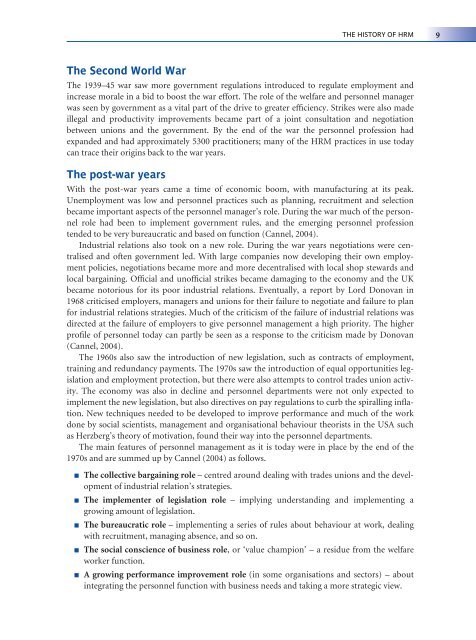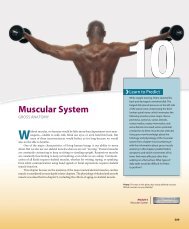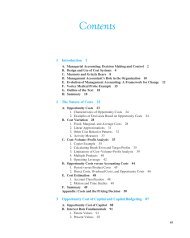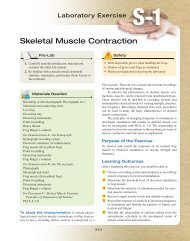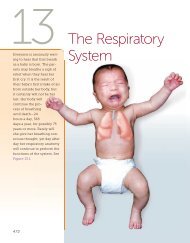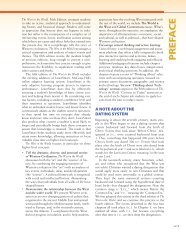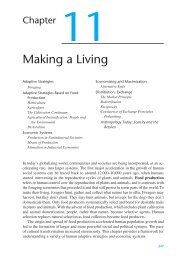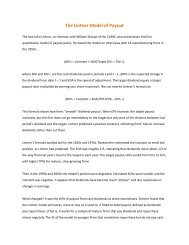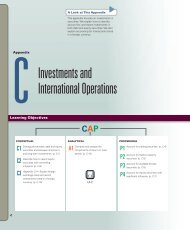The role of human resource management
The role of human resource management
The role of human resource management
Create successful ePaper yourself
Turn your PDF publications into a flip-book with our unique Google optimized e-Paper software.
<strong>The</strong> Second World War<br />
<strong>The</strong> 1939–45 war saw more government regulations introduced to regulate employment and<br />
increase morale in a bid to boost the war effort. <strong>The</strong> <strong>role</strong> <strong>of</strong> the welfare and personnel manager<br />
was seen by government as a vital part <strong>of</strong> the drive to greater efficiency. Strikes were also made<br />
illegal and productivity improvements became part <strong>of</strong> a joint consultation and negotiation<br />
between unions and the government. By the end <strong>of</strong> the war the personnel pr<strong>of</strong>ession had<br />
expanded and had approximately 5300 practitioners; many <strong>of</strong> the HRM practices in use today<br />
can trace their origins back to the war years.<br />
<strong>The</strong> post-war years<br />
THE HISTORY OF HRM 9<br />
With the post-war years came a time <strong>of</strong> economic boom, with manufacturing at its peak.<br />
Unemployment was low and personnel practices such as planning, recruitment and selection<br />
became important aspects <strong>of</strong> the personnel manager’s <strong>role</strong>. During the war much <strong>of</strong> the personnel<br />
<strong>role</strong> had been to implement government rules, and the emerging personnel pr<strong>of</strong>ession<br />
tended to be very bureaucratic and based on function (Cannel, 2004).<br />
Industrial relations also took on a new <strong>role</strong>. During the war years negotiations were centralised<br />
and <strong>of</strong>ten government led. With large companies now developing their own employment<br />
policies, negotiations became more and more decentralised with local shop stewards and<br />
local bargaining. Official and un<strong>of</strong>ficial strikes became damaging to the economy and the UK<br />
became notorious for its poor industrial relations. Eventually, a report by Lord Donovan in<br />
1968 criticised employers, managers and unions for their failure to negotiate and failure to plan<br />
for industrial relations strategies. Much <strong>of</strong> the criticism <strong>of</strong> the failure <strong>of</strong> industrial relations was<br />
directed at the failure <strong>of</strong> employers to give personnel <strong>management</strong> a high priority. <strong>The</strong> higher<br />
pr<strong>of</strong>ile <strong>of</strong> personnel today can partly be seen as a response to the criticism made by Donovan<br />
(Cannel, 2004).<br />
<strong>The</strong> 1960s also saw the introduction <strong>of</strong> new legislation, such as contracts <strong>of</strong> employment,<br />
training and redundancy payments. <strong>The</strong> 1970s saw the introduction <strong>of</strong> equal opportunities legislation<br />
and employment protection, but there were also attempts to control trades union activity.<br />
<strong>The</strong> economy was also in decline and personnel departments were not only expected to<br />
implement the new legislation, but also directives on pay regulations to curb the spiralling inflation.<br />
New techniques needed to be developed to improve performance and much <strong>of</strong> the work<br />
done by social scientists, <strong>management</strong> and organisational behaviour theorists in the USA such<br />
as Herzberg’s theory <strong>of</strong> motivation, found their way into the personnel departments.<br />
<strong>The</strong> main features <strong>of</strong> personnel <strong>management</strong> as it is today were in place by the end <strong>of</strong> the<br />
1970s and are summed up by Cannel (2004) as follows.<br />
■ <strong>The</strong> collective bargaining <strong>role</strong> – centred around dealing with trades unions and the development<br />
<strong>of</strong> industrial relation’s strategies.<br />
■ <strong>The</strong> implementer <strong>of</strong> legislation <strong>role</strong> – implying understanding and implementing a<br />
growing amount <strong>of</strong> legislation.<br />
■ <strong>The</strong> bureaucratic <strong>role</strong> – implementing a series <strong>of</strong> rules about behaviour at work, dealing<br />
with recruitment, managing absence, and so on.<br />
■ <strong>The</strong> social conscience <strong>of</strong> business <strong>role</strong>, or ‘value champion’ – a residue from the welfare<br />
worker function.<br />
■ A growing performance improvement <strong>role</strong> (in some organisations and sectors) – about<br />
integrating the personnel function with business needs and taking a more strategic view.


